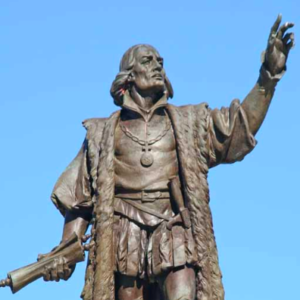Boston’s Acting Mayor Kim Janey sparked howls of anger when she unilaterally whacked Columbus Day, replacing it with the politically correct “Indigenous Peoples’ Day.”
Janey made the sweeping change via an executive order signed in front of members of the indigenous community, rather than taking it through the city council’s democratic process, Boston media sources report.
In Boston’s North End, long an Italian-American community, local residents view Columbus Day as more than just a long weekend. For them, Columbus Day is an opportunity to celebrate their heritage and history in the U.S.
The National Christopher Columbus Association, based in Washington, D.C., called it “a disturbing development in Boston. An executive order by the acting mayor without any public comment.”
Italian-Americans across New England were upset by Janey’s decision as well.
“Columbus Day honors Italian-Americans who have contributed to the greatness of this nation,” state Sen. Lou D’Allesandro (D-Manchester) told NHJournal. “To override Columbus Day doesn’t make any sense to me. If anyone wants to create an Indigenous Peoples Day, go ahead — but don’t take away what Italian Americans have done for this country.”
During a debate over the issue last year, Ward 5 Alderman Anthony Sapienza explained he would be proud to support recognizing Indigenous Peoples’ Day, but on a day other than Columbus Day.
“However, in this instance, these people have come here and asked us to insult another group of people who already have a day on that particular day they’re asking for and they should pick another day. Now, we celebrate many days in this city. We are a welcoming city. But what we haven’t done is we haven’t declared a day that’s already been taken by one people and try to give it to people of… somebody else.”
Sapienza said it is a unique situation because the people advocating for Indigenous Peoples’ Day also want to insult the Italians. He said he has a deep problem with that.
Columbus Day celebrates Christopher Columbus, an Italian-born explorer who set sail bound for Asia in 1492 and landed in the Bahamas.
It is a federal holiday in the United States and has been celebrated nationally since 1892 when President Benjamin Harrison issued a proclamation encouraging Italian Americans to engage in festivities.
Many believe Harrison did so because, after the lynching of 11 Italian immigrants in New Orleans, La., he wanted to ease tensions with leaders in Italy.
There are more than 60 cities and towns in America celebrating Indigenous Peoples’ Day, according to indigenouspeoplesdayma.org. Seven states also recognize Indigenous Peoples’ Day and Columbus Day, including Maine and Vermont, according to the website.
In September of 2017, the town of Durham became the first in New Hampshire to recognize Indigenous Peoples’ Day. Town councilors did not replace Columbus Day, however.
Town Administrator Todd Selig told NHJournal that if Native Americans and Italians sat down, they would find they have a lot in common.
Selig acknowledged that when councilors first considered dropping the holiday for Indigenous Peoples’ Day, they did receive some complaints from Italian people inside and outside the community.
Selig said Durham will be flying an Indigenous Peoples’ Day flag at the Durham Town Hall this year and people can take a photo in front of it from the sidewalk if they want to recognize the day.
Italians are also welcome to celebrate their own heritage as they wish, Selig said. “It gives everybody a little bit of something,” Selig said.
Selig says it’s time to give up the idealized version of the Italian explorer.
“(Columbus) was a business guy at the time and he wanted to make money,” Selig said. “On further review, it turns out he was not really the hero people made him out to be. He was, in many ways, the villain.”
Francis Alexander Malofiy, who represents the Christopher Columbus Memorial Association, disagrees.
“I am proud to be the lawyer representing the Christopher Columbus Memorial Association,” Malofiy said during a debate over removing a statue of Columbus near Philadelphia last month. “Without Columbus, there is no New World, there is no America, there is no Declaration of Independence, Constitution, or Bill of Rights.
“As a first-generation American whose parents immigrated to the U.S. on a boat after their fathers were killed in WWII, I know the horror of war, the call for peace, and the rights in this country often taken for granted. The First Amendment protects our words, thoughts, feelings, religion, and rights to disagree with and petition our government. And, the Second Amendment is there to protect the First. We stand on the shoulders of those who came before us,” Malofiy said.
“Thank you, Christopher Columbus.”




